De Nederlandse dichteres, schrijfster, illustrator en cabaretière Johanna Rutgera van Leeuwen werd geboren op 24 september 1952 in Den Haag. Zie ook alle tags voor Joke van Leeuwen op dit blog.
Thuis
Een man draagt zichzelf door de dag,
de handen tot kommen, ze testen
de adem, die is er, alsook zijn papieren,
die liggen op stapels, dringend en dun.
Op steigers die uitzicht schoonwassen,
ruit spiegelt ruit ruit, daartussen de pluisjes,
de mussen, een lijstje te licht om te landen,
waarop wat onthouden moest ooit.
Op avonden, luiken gesloten, de wereld
nog lang niet op orde, drie glazen,
een vierde, de schoenen als schepen
alleen op zeil, laat hij zich varen.
Hoe te poseren
Zet alles klaar om vooraf vol te zijn,
in forse hompen, snijdend te verdelen.
Valt het van tafels, zal het vallen.
Grond eindigt niet.
Zorg dat de servetten vleugels zijn en boten
voor ze op schoten liggen bij het morsen.
Moet iemand even doen alsof een hoed,
laat maar begaan.
Dan kruimels weg en kleren recht en voorsten
vooraan neergelegd, daarachter door de knieën,
daarachter staan. Lach zacht, vlucht niet,
kijk niemand aan.
Alleen die van de overkant die achteruit
om meer en achteruit en achterover
slaat en schiet en alles neemt
in schaapjeslucht.
Aanbod
Langs deze, langs deze mij
deze mij onsympathieke
weg, schuilnamenlaan.
Wat zal ik zeggen? Ik ben
schorpioen en heb hobby’s, als
landschapsgeschiedenis enz.
Dat ik graag vis eet en veel lees
over vissen, dus waar ze van leven
en hoe wij van hen.
Verder een slank postuur,
afstand is geen bezwaar,
afstand is tijd en die neem ik
met iemand, met wijn erbij
en open haard soms ook
en graag mooi weer.
Jonger wel, jij dus, van hart,
longen enz. Ben zelf
intussen al over veel heen.
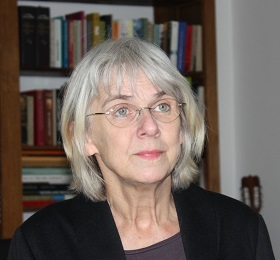
Joke van Leeuwen (Den Haag, 24 september 1952)
De Nederlandse dichter en schrijver Mark Boog werd geboren op 24 september 1970 in Utrecht. Zie ook alle tags voor Mark Boog op dit blog.
De rotonde (Fragment)
Hij ziet de weg.
Hij buigt het hoofd.
Het onweert in de verte.
De middag is een dreigende. De lucht
boven de stad is helder, maar het broeit.
De straten vol met haast. Kantoorgebouwen
lopen leeg. Er is een vreemde kilte
in de wind die tussen hoge huizen
onvoorspelbaar waait. Toch zweet Van Dam,
alsof hij ziek is of gedronken heeft.
Hij veegt zijn voorhoofd af, versnelt zijn pas.
Het is veel stiller dan gebruikelijk.
Gedempte stemmen. Doffe stappen. Niemand
viert het einde van de werkweek in
de kroeg. De vrijdag houdt zijn adem in.
Hij ziet de weg.
Hij buigt het hoofd.
Het onweert in de verte.
[…]
Onooglijk wordt het. Almaar lelijker,
vanuit het centrum naar de randen van
de stad. Grijs en somber is het leven
in de buitenwijken – als Van Dam.
Rondom een landschap dat gemiddeld is,
plat en overzichtelijk, het landschap
dat hij zoekt. Het vlakke land is troost.
Want dieptepunten kent hij, hoogten ook:
de souvenirs bewaart hij, ongewild.
Een diepe weerzin overvalt Van Dam
zodra hij weg gaat gooien, dus hij gooit
niet weg. Bewaart, bewaart. Tot het te veel is.
Hij ziet de weg.
Hij buigt het hoofd.
Het onweert in de verte.
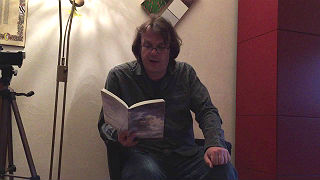
Mark Boog (Utrecht, 24 september 1970)
De Nederlandse schrijver A.L. Snijders (pseudoniem van Peter Cornelis Müller) werd geboren op 24 september 1937 in Amsterdam. Zie ook alle tags voor A.L. Snijders op dit blog.
Haring
Bij de haringkar staat een norse man die vraagt of de vis wel koud is. De haringverkoper is geïrriteerd: ‘Als de vis niet koud was, zou ik hier niet veertig jaar staan.’ Kernachtig antwoord, de norse man moet nadenken. Naast me staat iemand die op fluistertoon zegt dat je in Stavoren de beste haring van ons land kunt krijgen. Ik zeg: dat is meer dan honderd kilometer hiervandaan, dat heb ik er niet voor over.’ Als ik aan de beurt ben, sta ik voor een dilemma (misschien wel een trilemma). De haringman waagt of ik de haring aan één stuk wil of in mootjes? En dan nog iets, met uitjes en/of zuur? Ik vraag hem het hele verhaal te vertellen. Hij doet het, het is zijn trots. Het gaat zoals altijd om de natuurlijke controverse tussen Rotterdam en Amsterdam. Rotterdammers houden de haring bij de staart en Amsterdammers willen hem in stukken. Om dit goed te begrijpen moet je bij de Zeeuwen beginnen. Zij waren de eersten die de haringen aan wal brachten en met het kaken begonnen. Zij aten de vis puur. Daarna brachten ze de vaten met het trage paard naar Rotterdam, waar het zachte rotten moest worden gemaskeerd met uitjes. En tenslotte ging het naar Amsterdam waar het zuur erbij kwam. De vraag was daar groter dan het aanbod en er was meer geld, men kon het zich permitteren de vis in stukken te verkopen. Het is een hapklaar historisch verhaal, ik kan het nauwelijks geloven.
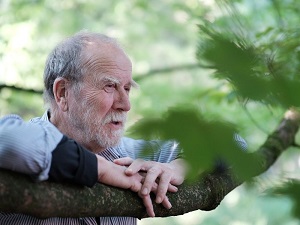
A.L. Snijders (Amsterdam, 24 september 1937)
De Chileense schrijver Alejandro Zambra werd op 24 september 1975 geboren in Santiago de Chile, waar hij ook opgroeide. Zie ook alle tags voor Alejandro Zambra op dit blog.
Uit: Multiple Choice (Vertaald door Megan McDowell)
“Pay no mind, my son, to what I tell you; pay me no mind at all. I hope that time, in your memory, will mitigate my shouting, my inappropriate remarks, and my stupid jokes. I hope that time will erase almost all my words, and preserve only the warm, still murmur of love. I hope that very soon someone invents a remote control that lets you lower my volume, pause me, fast-forward through unpleasant scenes, or rewind very quickly to happy days, so that you can experience whenever you want the freedom of acting without my vigilance, the immense pleasure of trying out a life without me. And you could even decide, for example, if it were necessary, to erase me. I don’t mean erase these words, which in and of themselves are liquid, perishable. Rather, erase me completely, as if I’d never existed.
I know that is impossible.
That’s what life consists of, I’m afraid: erasing and being erased. We were on the verge of erasing you, as you may already know or suspect. We didn’t want to have a child. The thing is, we were still someone’s children then. So much so that the possibility of being parents ourselves seemed terribly distant. We also knew in advance that we were going to separate. For us love was an incident, an accident, a practice — best-case scenario, a high-risk sport.
A little while before we found out about the pregnancy, we had considered breaking up. Maybe it will come as a shock to learn that the reason for our fights had been the dilemma of whether or not to get a dog. At first she wanted one, but I thought it was too much responsibility. Then I was the one who wanted it, and she argued that we were fine as we were, that we had to establish ourselves as a couple before getting a dog.
In the end we agreed: we weren’t sure we’d be able to take good care of it or have the patience and discipline to take it for walks every day, be sure its dish was always full of food, apply flea repellent every month.
We thought we were too young to take on the responsibility of a dog, but we weren’t really so young: I was twenty-four, same as your mother. At that age, my father already had two children. The younger, four years old, was me. But in my generation — I know you hate that word — having children was something we only began to think about at thirty or thirty-five, if we ever started thinking about it. Anyway, I don’t know if it’s any consolation, but when we found out about the pregnancy we never considered the possibility of an abortion. I mean, we thought about it, we asked about prices at clandestine clinics, we even went to one of them, but we didn’t seriously consider it. It would be inexact to say that we changed our minds, because, as I say, it was one idea among many, but it wasn’t the primary one.”
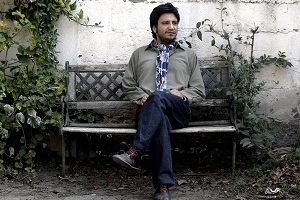
Alejandro Zambra (Santiago de Chile, 24 september 1975)
De Amerikaanse schrijver Francis Scott Fitzgerald werd geboren op 24 september 1896 in Saint Paul, in de staat Minnesota. Zie ook alle tags voor F. Scott Fitzgerald op dit blog.
Uit: The Love of the Last Tycoon
“I’m sorry I was short with him–but I don’t like a man to approach me telling me it for my sake.
“Maybe it was,” said Wylie
“It’s poor technique.”
“I’d all for it,” said Wylie. “I’m vain as a woman. If anybody pretends to be interested in me, I’ll ask for more. I like advice.”
Stahr shook his head distastefully. Wylie kept on ribbing him–he was one of those to whom this privilege was permitted. “You fall for some kinds of flattery,” he said. “this ‘little Napoleon stuff.'”
“It makes me sick,” said Stahr, “but it’s not as bad as some man trying to help you.”
“If you don’t like advice, why do you pay me?”
“That’s a question of merchandise,” said Stahr. “I’m a merchant. I want to buy what’s in your mind.”
“You’re no merchant,” said Wylie. “I knew a lot of them when I was a publicity man, and I agree with Charles Francis Adams.”
“What did he say?”
“He knew them all–Gould, Vanderbilt, Carnegie, Astor–and he said there wasn’t one he’d care to meet again in the hereafter. Well–they haven’t improved since then, and that’s why I say you’re no merchant.”
“Adams was probably a sourbelly,” said Stahr. “He wanted to be head man himself, but he didn’t have the judgement or else the character.”
“He had brains,” said Wylie rather tartly.
“It takes more than brains. You writers and artists poop out and get all mixed up, and somebody has to come in and straighten you out.” He shrugged his shoulders. “You seem to take things so personally, hating people and worshipping them–always thinking people are so important-especially yourselves. You just ask to be kicked around. I like people and I like them to like me, but I wear my heart where God put it–on the inside.”
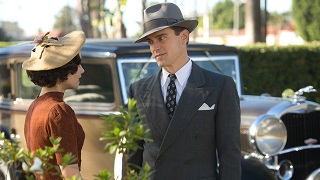
F. Scott Fitzgerald (24 september 1896 – 21 december 1940)
Scene uit de tv-serie “The Last Tycoon” uit 2016 met Lily Collins (Celia Brady) en Matt Bomer (Monroe Stahr)
De Britse schrijfster en filmmaakster Shamim Sarif werd geboren op 24 september 1969 in Londen. Zie ook alle tags voor Shamim Sarif op dit blog.
Uit: The World Unseen
“Even lying on the roof, with only the cheap slates in her line of vision, she could tell that it was a police car. There was a carelessness in the skid of the tyres over the sandy road, and in the way the handbrake was pulled up while the wheels were still turning, leaving a slight screech hanging in the heavy air. She stopped hammering, and peered over the edge of the eaves. They had parked so close to the restaurant door that they had broken one of the flowerpots that Jacob had planted only the day before.
“Bastards,” she said, under her breath.
She left the sign half-nailed and hanging, and climbed down the ladder. Her steps were measured, gaining her time to think. A year ago she would have been inside the café within seconds, running in her eagerness to grasp and fight whatever new obstacle was being thrown in her way. But many months of struggling against rules and regulations that made no sense to her at all had blunted her appetite for confrontation, and so she walked more slowly now, curbing her natural impulse, and when she looked over at the police vehicle, her brow showed tiny lines of concentration.
One of them, the driver, was still in the car. She knew many of the local police, but this one was a stranger to her and she was taken for a moment by his looks – a square, handsome face edged with soft blond hair – until she met his cool, blue gaze, which showed only arrogance. He looked her up and down, and resolutely, she held his look for a moment.
“Never seen a woman in trousers before?” she asked, too softly for him to hear; but to her chagrin he wound down his window.
“What?”
She had no choice but to repeat herself. She spoke clearly, and his mouth gave a slight curl.
“Never seen an Indian girl in trousers, that’s for sure,” he replied.
She turned away and went inside, stopping just by the door. The place was more than half full, she noted, but she could still hear the boerewors sausages frying all the way back in the kitchen. Nobody spoke, and nobody looked up, but every pair of eyes was covertly fixed on the policeman standing at the counter. Jacob could see her, she knew, but he made no sign. He kept wiping the glasses, nodding occasionally. Officer Stewart had a friendly arm leaning on the polished wood and with the other hand he pulled thoughtfully at his trimmed beard.
“Listen, Jacob, I mean the two of you no harm, but these laws are making life bloody difficult for the police.”
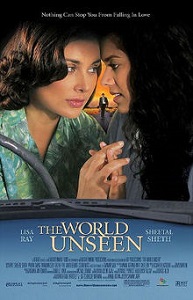
Shamim Sarif (Londen, 24 september 1969)
Poster voor de gelijknamige film uit 2007
De Nederlandse dichter Hendrik Tollens werd op 24 september 1780 te Rotterdam geboren. Zie ook alle tags voor Hendrik Tollens op dit blog.
Herfst (Fragment)
En, gij schoonste gaard van allen,
Waar de wijnrank welig wast!
Laat gij ook uw bladers vallen?
Houd ze nog een weinig vast.
IJdel wenschen, ijdel staren!
Nergens wiegen bloem noch blaren,
Waar de jeugd te kozen zat;
Nergens schaduw meer te vinden,
Die de twijgen van de linden
Plag te schildren op ons pad!
Lust en leven zijn verdwenen,
En vergeten zang en spel;
Vlugt en vogels vloden henen,
En verstomden in ’t vaarwel.
Stil! wat dreunt daar door de hagen?
’t Is een schot. Corinna, kom!
De adel is in ’t woud aan ’t jagen:
Kom! de roof beraamt zijn lagen:
Vlugten wij naar ’t vlek weerom.
Zie! daar stuiven uit hun kloven
Duizend vogels op naar boven,
Siddrend uit den slaap gewekt;
Jager! spaar die vlugtelingen,
Die der lente ’t welkom zingen,
Als de winter huiswaarts trekt. –
Kom, Corinna! toef niet langer;
Hoor! de hagel klettert neer;
’t Eenzaam woud heeft thans geen zanger,
Thans het veld geen bloemen meer.
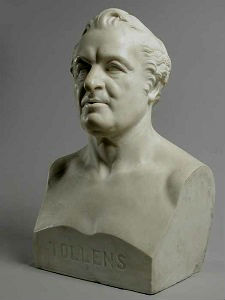
Hendrik Tollens (24 september 1780 -21 oktober 1856)
Borstbeeld door Johan Theodore Stracké uit 1879 in het Museum van de stad Rotterdam
De Canadese dichter, essayist en schrijver Fernand Ouellette werd geboren in Montreal, Quebec, op 24 september 1930. Zie ook alle tags voor Fernand Ouellette op dit blog.
Septembre
Venir de septembre,
Neuf, entier, vagissant,
Émergeant des abysses, au moment
Princier des érables à la hauteur
De couleurs mûrissantes.
Il n’y avait aucun rempart
Contre l’azur, ni de contrainte
Pour les sons des lumières.
Le devenir demeurait insondable,
Secrètes les semences germant dans les jours.
Le chant né des naissances viendrait
Plus tard, après avoir surmonté
La dureté des pierres déposées dans le matin,
Après le travail de l’amour, des cauchemars
Rythmant la nuit, composant des roses noires.
Dehors
L’étrange issu
Du fabuleux silence,
Sans noeuds, sans torsions,
Allant sur le sol cahoteux,
S’agrandissant,
De l’écriture qui émerge,
Proportionnée au désir,
Au dehors qui se laisse capter.
Les lieux se mettent à scintiller.
Les oiseaux déferlent par tribus
Sur les faîtes des feuillages.
Les passages s’ouvrent
En repoussant le noir, débouchant
Sur le magnifique revers
Des vocables.
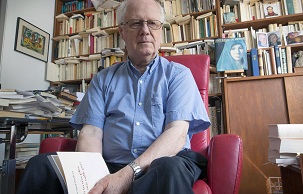
Fernand Ouellette (Montreal, 24 septenber 1930)
De Amerikaanse dichteres, schrijfster,suffragette en abolitioniste Frances Ellen Watkins Harper werd geboren in Baltimore op 24 september 1825. Zie ook alle tags voor Frances Harper op dit blog.
Songs for the People
Let me make the songs for the people,
Songs for the old and young;
Songs to stir like a battle-cry
Wherever they are sung.
Not for the clashing of sabres,
For carnage nor for strife;
But songs to thrill the hearts of men
With more abundant life.
Let me make the songs for the weary,
Amid life’s fever and fret,
Till hearts shall relax their tension,
And careworn brows forget.
Let me sing for little children,
Before their footsteps stray,
Sweet anthems of love and duty,
To float o’er life’s highway.
I would sing for the poor and aged,
When shadows dim their sight;
Of the bright and restful mansions,
Where there shall be no night.
Our world, so worn and weary,
Needs music, pure and strong,
To hush the jangle and discords
Of sorrow, pain, and wrong.
Music to soothe all its sorrow,
Till war and crime shall cease;
And the hearts of men grown tender
Girdle the world with peace.
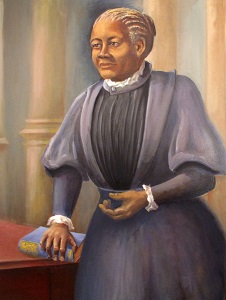
Frances Harper (24 september 1825 – 25 februari 1911)
Zie voor nog meer schrijvers van de 24e september ook mijn blog van 24 september 2017 deel 2.
